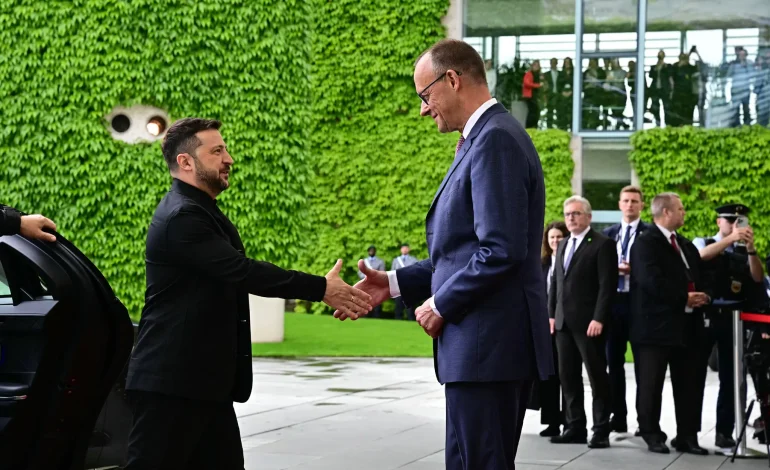Germany Backs Ukrainian Development of Independent Long-Range Missile Capability

German Chancellor Friedrich Merz announced on Wednesday that Germany will support Ukraine in developing its own long-range missile systems, a move intended to bolster the country’s defense against Russia without being bound by external limitations on range or targeting.
Speaking at a joint news conference with Ukrainian President Volodymyr Zelenskyy in Berlin, Merz said the new cooperation initiative aims to give Ukraine “all the capabilities that truly enable it to successfully defend the country.” This includes support for expanded domestic production of advanced weapons, such as long-range missiles.
For much of the more than three-year war, Ukraine has relied on weapons from Western partners that often came with restrictions on how and where they could be used, due to concerns over provoking direct conflict with Russia. Some Western nations, including Germany, have been cautious about supplying systems that could be used to strike deep inside Russian territory.
Merz’s offer marks a significant shift in Berlin’s posture. While he stopped short of confirming delivery of Germany’s own Taurus cruise missiles — a long-standing request from Kyiv — Merz emphasized that the new initiative would enable Ukraine to strike military targets beyond its borders using domestically produced systems.
“Ukraine will be able to fully defend itself, including against military targets outside its own territory,” he said.
Germany, the second-largest military donor to Ukraine after the United States, is stepping up its role at a time when American involvement in the conflict appears to be receding. Chancellor Merz, who took office earlier this month, has moved swiftly to position Germany as a leader in European security efforts.
President Zelenskyy’s visit to Berlin was part of a broader diplomatic push to secure deeper military and industrial support from European allies.
“We need sufficient long-range capabilities,” he said, adding that securing reliable funding for domestic arms production remains one of Ukraine’s biggest challenges.
Ukrainian officials have stated they require around $30 billion annually to sustain and scale up local arms manufacturing. Zelenskyy noted that Ukraine’s current needs include attack drones, interceptors, cruise missiles, and ballistic systems.
The intensification of military cooperation comes amid an uptick in front-line fighting and long-range strikes from both sides. In recent days, Ukraine has ramped up drone attacks on Russian territory, while Moscow has launched one of the largest drone offensives of the war against Ukraine. Ukraine’s air force said it intercepted or jammed dozens of Russian drones and missiles in the latest barrage.
On the diplomatic front, both Zelenskyy and Merz criticized Moscow for delaying its response to a proposed ceasefire, which Kyiv has accepted. Kremlin spokesperson Dmitry Peskov warned that Germany’s latest military support could obstruct peace efforts and reiterated that Russia has national interests it will not compromise on.
Zelenskyy reiterated Ukraine’s openness to high-level talks, including a possible trilateral meeting with Russian President Vladimir Putin and US President Donald Trump. The Ukrainian leader expressed hope that the war could end by mid-2026, depending on continued international support and sanctions against Russia.
While peace prospects remain uncertain, the industrial aspect of the conflict continues to grow in importance. Analysts note that the ability to sustain and scale weapons production could prove decisive in a prolonged war of attrition.
“In Ukraine, nothing less than the peace order of our entire continent is at stake,” Chancellor Merz told German lawmakers earlier this month.
With no major breakthroughs expected in the near term, both Ukraine and Russia are accelerating efforts to strengthen their defense industries and supply chains.
The Associated Press, the New York Times, and Reuters contributed to this report.









The latest news in your social feeds
Subscribe to our social media platforms to stay tuned